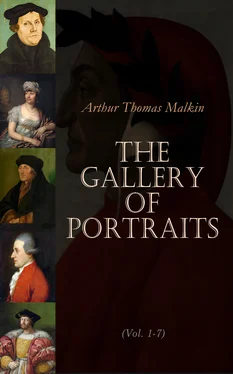Whatever may be the value of the fruits of Pascal’s genius, it should be remembered that they were all produced within the space of a life which did not number forty years, and that he was so miserably the victim of disease that from the time of boyhood he never passed a day without pain.
His health had probably been impaired by his earlier exertions; but the intense mental labour expended on the arithmetical machine appears to have completely undermined his constitution, and to have laid the foundation of those acute bodily sufferings which cruelly afflicted him during the remainder of his life. His friends, with the hope of checking the evil, sought to withdraw him from his studies, and tempted him into various modes of relaxation. But the remedy was applied too late. The death of his father in 1651, and the retirement of his unmarried sister from the world to join the devout recluses of Port Royal-des-Champs, released him from all restraint. He sadly abused this liberty, until the frightful aggravation of his complaints obliged him to abandon altogether his scientific pursuits, and reluctantly to follow the advice of his physicians, to mix more freely in general society. He obtained some relief from medicine and change of habits; but, in 1654, an accident both made his recovery hopeless, and destroyed the relish which he had begun to feel for social life. He was in his carriage on the Pont de Neuilly, at a part of the bridge which was unprotected by a parapet, when two of the horses became unruly, and plunged into the Seine. The traces broke, and Pascal was thus saved from instant death. He considered that he had received a providential warning of the uncertainty of life, and retired finally from the world, to make more earnest preparation for eternity. This accident gave the last shock to his already shattered nerves, and to a certain extent disordered his imagination. The image of his late danger was continually before him, and at times he fancied himself on the brink of a precipice. The evil probably was increased by the rigid seclusion to which from this time he condemned himself, and by the austerities which he inflicted on his exhausted frame. His powerful intellect survived the wreck of his constitution, and he gave ample proof to the last that its vigour was unimpaired.
In his religious opinions he agreed with the Jansenists, and, without being formally enrolled in their society, was on terms of intimate friendship with those pious and learned members of the sect, who had established themselves in the wilds of Port Royal. His advocacy of their cause at a critical time was so important to his fame and to literature, that a few words may be allowed on the circumstances which occasioned it.
The Jansenists, though they earnestly deprecated the name of heretics, and were most fiercely opposed to the Huguenots and other Protestants, did in fact nearly approach in many points the reformed churches, and departed widely from the fashionable standard of orthodoxy in their own communion. They were in the first instance brought into collision with their great enemies the Jesuits by the opinions which they held on the subjects of grace and free-will. As the controversy proceeded, the points of difference between the contending parties became more marked and more numerous. The rigid system of morals taught and observed by the Jansenists, and the superior regard which they paid to personal holiness in comparison with ceremonial worship, appeared in advantageous contrast with the lax morality and formal religion of the Jesuits. Hence, though there was much that was repulsive in their discipline, and latterly, not a little that was exceptionable in their conduct, they could reckon in their ranks many of the most enlightened as well as the most pious Christians in France. It was natural that Pascal, who was early impressed with the deepest reverence for religion, should be attracted to a party which seemed at least to be in earnest, whilst others were asleep; and it is more a matter of regret than of surprise, that latterly, in his state of physical weakness and nervous excitement, he should have been partially warped from his sobriety by intercourse with men, whose Christian zeal was in too many instances disfigured by a visionary and enthusiastic spirit. The Papal Court at first dealt with them tenderly; for it was in truth no easy matter to condemn their founder Jansenius, without condemning its own great doctor the celebrated Augustin. But the vivacious doctors of the Sorbonne, on the publication of a letter by the Jansenist Arnauld, took fire, and by their eagerness kindled a flame that well nigh consumed their own church.
Whilst they were in deliberation on the misdoings of Arnauld, Pascal put forth under the name of Louis de Montalte the first of that series of letters to “a friend in the country”—à un provincial par un de ses amis—which, when afterwards collected, received by an absurd misnomer, the title of the Provincial Letters of Pascal. In these letters, after having exhibited in a light irresistibly ludicrous, the disputes of the Sorbonne, he proceeds with the same weapon of ridicule, all powerful in his hand, to hold forth to derision and contempt the profligate casuistry of the Jesuits. For much of his matter he was undoubtedly indebted to his Jansenist friends, and it is commonly said that he was taught by them to reproach unfairly the whole body of Jesuits, with the faults of some obscure writers of their order. These writers, however, were at least well known to the Jesuits, their writings had gone through numerous editions with approbation, and had infused some portion of their spirit into more modern and popular tracts. Moreover, the Society of Jesuits, constituted as it was, had ready means of relieving itself from the discredit of such infamous publications; yet amongst the many works, which by their help found a place in the index of prohibited books, Pascal might have looked in vain for the works of their own Escobar. However this may be, it is universally acknowledged, that the credit of the Jesuits sunk under the blow, that these letters are a splendid monument of the genius of Pascal, and that as a literary work they have placed him in the very first rank among the French classics.
It seems that he had formed a design, even in the height of his scientific ardour, of executing some great work for the benefit of religion. This design took a more definite shape after his retirement, and he communicated orally to his friends the sketch of a comprehensive work on the Evidences of Christianity, which his early death, together with his increasing bodily infirmities, prevented him from completing. Nothing was left but unconnected fragments, containing for the most part his thoughts on subjects apparently relating to his great design, hastily written on small scraps of paper, without order or arrangement of any kind. They were published in 1670, with some omissions, by his friends of Port Royal, and were afterwards given to the world entire, under the title of the Thoughts of Pascal. Many of the thoughts are such as we should expect from a man who with a mind distinguished for its originality, with an intimate knowledge of scripture, and lively piety, had meditated much and earnestly on the subject of religion. In a book so published, it is of course easy enough to find matter for censure and minute criticism; but most Christian writers have been content to bear testimony to its beauties and to borrow largely from its rich and varied stores. Among the editors of the Thoughts of Pascal are found Condorcet and Voltaire, who enriched their editions with a commentary. With what sort of spirit they entered on their work may be guessed from Voltaire’s well known advice to his brother philosopher. “Never be weary, my friend, of repeating that the brain of Pascal was turned after his accident on the Pont de Neuilly.” Condorcet was not the man to be weary in such an employment; but here he had to deal with stubborn facts. The brain of Pascal produced after the accident not only the Thoughts, but also the Provincial Letters, and the various treatises on the Cycloid, the last of which was written not long before his death.
Читать дальше












